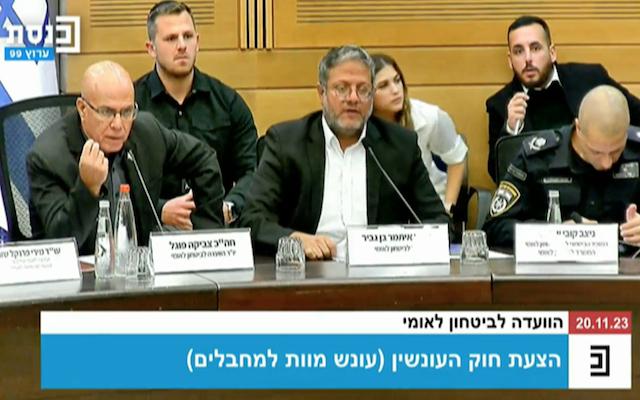During a Knesset committee meeting on Monday, intense exchanges unfolded between members of the Otzma Yehudit party and relatives of hostages held by Hamas in Gaza. The meeting, which focused on a contentious bill proposing the death penalty for terrorists, sparked concerns among the hostages' families about potential negative impacts on their loved ones.
Gil Dickmann, whose cousin Carmel Gat is among the hostages, emotionally pleaded with MK Tzvika Fogel, Chairman of the Knesset National Security Committee, and National Security Minister Itamar Ben Gvir, leader of Otzma Yehudit, to reconsider holding the hearing. Fogel countered that opposition to the bill equated to siding with Hamas over Israel. In a heated moment, MK Almog Cohen told a man, whose wife and daughter are hostages, that he had no right to monopolize the narrative of suffering.
Despite lacking coalition support, Fogel proceeded with the hearing. He argued against keeping Hamas terrorists imprisoned, suggesting they manipulate hostages' relatives to oppose the bill. Fogel openly accused Hamas of exploiting these families, but maintained that the death penalty for terrorists did not conflict with efforts to return the hostages safely.
Far right MPs in Knesset shout at relatives of Israeli hostages in #Gaza that they have “no monopoly on pain” as debate takes place on Ben Gvir “death penalty for terrorists” bill https://t.co/RhY2cjMhNT
— sebastian usher (@sebusher) November 20, 2023
Dickmann, objecting to being portrayed as representing Hamas, tearfully urged Ben Gvir to halt the legislation, citing the precarious situation of the hostages. Another man, whose family is also held captive, implored the committee to focus on rescuing Jews rather than discussing the execution of terrorists.
The session grew increasingly chaotic, with Cohen and Otzma Yehudit MK Limor Son Har Melech engaging in sharp exchanges with attendees. Cohen, later interviewed on Channel 12 News, stood by his remarks but questioned the timing of advancing the death penalty legislation. He experienced a health scare off-camera and was hospitalized.
BREAKING:
— Mango Tango (@MangoTangosauce) November 20, 2023
Israeli Families of the hostages are trying to freeze the 'death penalty' law.
"You are arguing about the blood of our families" - "Maybe instead of talking about the dead, you will talk about the living."
The family indicates fierce anger towards Ben Gvir pic.twitter.com/eXdSkN1pHP
The bill, proposed by Son Har Melech, stipulates the death penalty as the sole punishment for racially or hostility-motivated killings of Israelis. Former deputy attorney general Ran Nizri, representing the hostages' families, highlighted that existing law already permits the death penalty for terrorists, echoing former attorney general Avichai Mandelblit's earlier stance.
Post-hearing, Ben Gvir shared a photo of him consoling Dickmann, expressing solidarity with the hostages' families while advocating for the death penalty as a means to pressure Hamas. Dickmann, in response, criticized Ben Gvir for his actions, accusing him of exploiting their plight for publicity.
“I asked Itamar Ben Gvir to postpone the special discussion on the death penalty law for terrorists.
— Shona Murray (@ShonaMurray_) November 20, 2023
A discussion that will trample our families, endanger babies, old people, women and men.
Itamar caressed my cheek and said "I'll do it anyway". https://t.co/lDnoW9NaaC
It is important to note that many on the other side of enacting the death penalty in Israel point out that Hamas, a jihad organization espousing the Muslim Bortherhood philosophy of Islam conquering the world, is futile as it gives the militants what they aspire to, death as a result of battle. Jihad philosophy revolves around Shahid, or martyrdom, which is how the leadership sells the masses in Palestine on committing stabbing attacks, ramming attacks and even shooting attacks. Israel has only used the death penalty twice, the most famous was was the execution of Adolf Eichmann on June 1, 1962 after his criminal trial for crimes against humanity during the holocaust.
The Jewish State had also executed Meir Tobiansky on June 30th, 1948 for treason, although he was posthumously acquitted of those crimes. The State was new and was at the start of a war for surival against several Arab nations. The death penalty was abolished officially in 1954 but a special dispensation was made for Eichmann.


